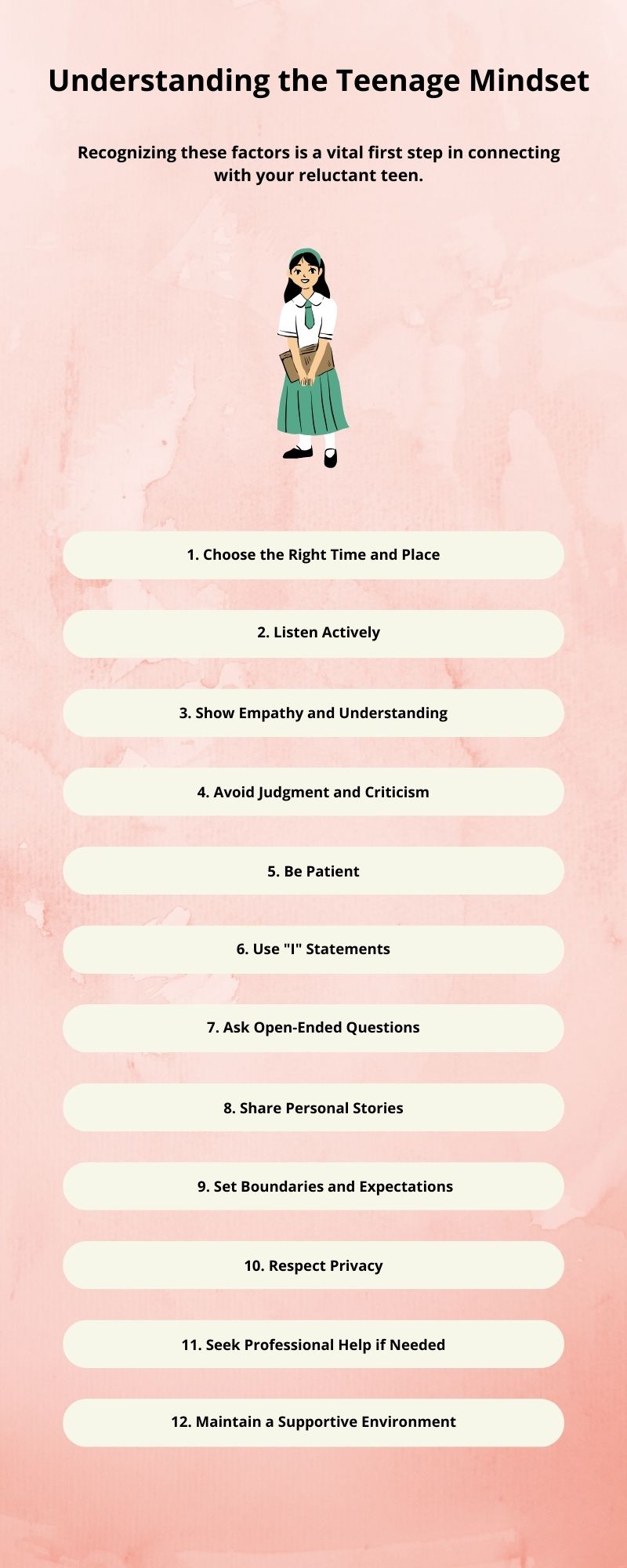Parenting a teenager is a rewarding but challenging journey. During these transformative years, it’s not uncommon for your once-talkative child to become a reluctant, often moody, teenager. Effective communication is crucial in navigating this phase and maintaining a healthy parent-child relationship. This article explores strategies for talking to a reluctant teen, promoting open dialogue, and fostering understanding.
Understanding the Teenage Mindset
Before delving into effective communication strategies, it’s essential to understand the teenage mindset. Adolescents are undergoing significant physical, emotional, and cognitive changes. They’re striving for independence, forming their identities, and often grappling with the challenges of peer pressure and self-discovery. Recognizing these factors is a vital first step in connecting with your reluctant teen.

#1. Choose the Right Time and Place
Timing matters when approaching a reluctant teenager. Don’t initiate conversations when they’re preoccupied, stressed, or fatigued. Opt for a relaxed, quiet moment when both of you can talk without distractions or time constraints. It allows your teen to be more receptive to your conversation.
#2. Listen Actively
Effective communication is a two-way street. While you may have valuable insights to share, it’s equally important to listen actively. Allow your teen to express their thoughts and feelings without interruption. It shows respect for their perspective and encourages them to open up more.
#3. Show Empathy and Understanding
Teenagers often struggle with complex emotions and may not have the vocabulary to articulate them. When your teen opens up, be empathetic and understanding. Offer emotional support, validate their feelings, and let them know you’re there for them, no matter what.
#4. Avoid Judgment and Criticism
Resist the urge to pass judgment or criticize your teen during conversations. While you may want to provide guidance, harsh criticism can shut down communication. Instead, frame your feedback in a constructive and non-judgmental manner. Encourage your teen to explore their choices and reflect on their decisions.
#5. Be Patient
Patience is crucial when talking to a reluctant teenager. It may take time for them to trust and confide in you. Continue to be available and receptive, even if they initially resist your efforts. The goal is to maintain an open line of communication for the long term.
#6. Use “I” Statements
“I” statements are a valuable communication tool. Instead of saying, “You need to do this,” try, “I feel concerned about this situation because…” This approach reduces defensiveness and encourages your teen to engage in a more constructive conversation.
#7. Ask Open-Ended Questions
Instead of asking questions that can be answered with a simple “yes” or “no,” pose open-ended questions that promote deeper discussion. For example, ask, “How do you feel about this situation?” or “Can you tell me more about what happened?”
#8. Share Personal Stories
Teenagers may respond positively to their own experiences and stories. Share relevant anecdotes from your adolescence, highlighting the challenges you faced and how you overcame them. It can foster a sense of connection and show your teen that you understand their struggles.
#9. Set Boundaries and Expectations
While fostering open communication, it’s essential to set clear boundaries and expectations. Teens need structure, and knowing the limits can make them feel safer. Make sure your rules are reasonable and consistently enforced.
#10. Respect Privacy
Respect your teen’s privacy, especially when it comes to their personal space and belongings. While you want to ensure their safety, invading their privacy can erode trust. Discuss boundaries and respect their need for personal space.
#11. Seek Professional Help if Needed
In some cases, a reluctant teenager’s reluctance to communicate may indicate deeper emotional or psychological issues. If you’re concerned about your teen’s well-being, consider seeking professional help. A therapist or counselor can provide valuable guidance and support for you and your teenager.
Final Words
Talking to a reluctant teenager can be challenging, but it’s a crucial aspect of parenting during the adolescent years. By understanding the teenage mindset, using effective communication strategies, and maintaining a supportive environment, you can bridge the gap with your reluctant teen. Remember that this phase is temporary, and with patience, empathy, and active listening, you can maintain a strong and healthy parent-child relationship.





